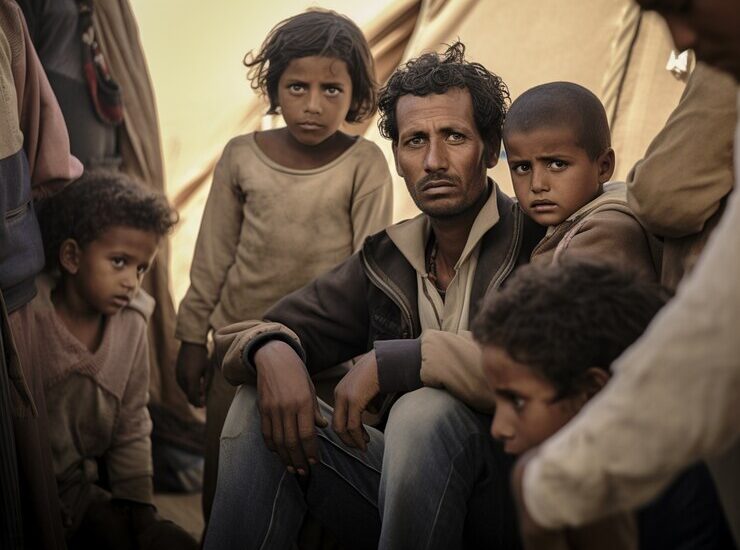Author: Sadia Javed
Advocate High Court, Immigration Lawyer & Asylum Expert
CEO of: SJ Law Experts, Islamabad
Email: SJLawExperts@gmail.com
Email: SadiaJaved.Lawyer@gmail.com
WhatsApp: +92 (0) 335 411 2288
Refugee’ law and refugees’ crisis are very wide subject which has been emerging since the creation of humanity itself, it is the crisis that pushes the people to take one of the most heartache and terrible decisions of their lives to leave their home place permanently or temporary in search of save shelters. According to the data, shared by world Refugee Council, nearly 70 million people around the globe sought asylum in other countries from persecution, also due to other reasons just in 2017 (World Refugee Council). However, other reasons are wider, for instance refugees are fled from their home country due to the fear of persecution, religious and ethnic cleansing, natural calamities and discriminatory attitude of their state-men and government.
Nevertheless, this journey of save and secure life for asylum seekers can never be achieved at any particular point, as when the reach at their desired place they have to face many other threats for instance, a fear of human trafficking, fear of sexual abuse, threat of racism and fear of seclusion (Amnesty International).
Apparently, it is immense difficult to trace back the evidently first case of asylum seeker and at the same time it is also a mayhem to give exact date of refugee’s law legislation process however, according to the data available, the first refugee law was codified by The King ETHELBERHT OF KENT in about 600 (S. Prakash Sinha). In that century the concept of asylum was differ as compare to present time. In that era the term asylum was referred as to hide or to provide shelter to someone who has been persecuted in his own country only in holy places for instance in churches and worship places. Since the kingship of King ETHELBERTH of KENT there had been evident of building the holy places mere for asylum derives. However, many scholars believe that the practice of asylum is as old as humanity itself (Roman Boed). By the centuries the laws regarding refugee’s protection and sanctuary have been adopted with numerous loopholes that were and still are subject to amendments.
Afghan Refugees Crisis:
The migration movement has never been stopped in any century however, Afghan refugee crisis was predominantly started with the Saur Revolution which is called the coup d’état movement. In this movement was raised by Afghan political party, People Democratic Party of Afghanistan (PDPA) against the Afghan President Daud Khan. In this revolution most of President family members were killed on 27-28 April 1978 (Afghan Saur Revolution). The PDPA was backed by the Soviet Union. After the assassination of President Daud Khan, Nur Muhammad Taraki formed his government and became the President of Afghanistan.
From the very movement the seasonal migration had been started and this seasonal migration was converted into bulk of refugees’ crisis after the soviet invasion in Afghanistan (RHEA ABRAHAM). Still the situation was paramount sensitive and instable that soviet invasion had been started in the region in 1979. After the Soviet Invasion Afghans started to seek for secure shelter in their neighboring countries, mainly in Pakistan and Iran (REHA ABRAHAM).
Pakistan is one the highly rating countries who has accommodated over 3 million Afghan refugees since 1979 (NASREEN GHUFRAN). After the ten year of invasion, when in 1988 soviet had withdrawn from Afghanistan, the Afghan repatriation process has been started. Pakistan with the collaboration with |UNHCR made a voluntary repatriation policy in 2002 for Afghan refugees. Under this policy every Afghan is being given four hundred dollars for voluntary repatriation, as a result since 2002, about 3.8 million refugees have been returned to Afghanistan, however, there are still three million registered and unregistered refugees in Pakistan, it is also believed that, the number of unregistered refugees in Pakistan could be greater than the actual estimation (AMINA KHAN). Many of them are still reluctant to go back to their home country due to scarcity of shelter, employment opportunities and other basic necessities of life. Similarly, more than ninety thousand Afghan are still in Iran and do not want to go back to their home country (NASREEN GHUFRAN).
Introduction of United Nations High Commissioners of Refugees:
The United Nation High Commissioner for Refugees (UNHCR) was established under the General Assembly Resolution 428 (V) of 14 December 1950 (Statute). The office was maintained to after WWII to help out destitute and homeless Europeans who had fled from persecution (UNHCR). The mandate of UNHCR is to accommodate the influx of refugees around the globe, also to provide the basic necessities of life, to help them in term of their repatriation in their home country and to make policies for the host countries. Now about it is estimated that, there are 16.1 million refugees under the mandate of UNHCR (UNHCR).
Notwithstanding, after getting its mandate, UNHCR started working to help out the bulk of refugees not only in any specific region but all around the world. UNHCR has played tremendous role in helping out the refugees and it got its first Nobel Peace Prize in 1954 for its leading-edge working in Europe, similarly in 1956, it had leaded the Hungarian for resettlement procedure, another achievement was during 1960 by helping the Asian and Latin American refugees, however, conversely, the start of the 21st century is itself witness of UNHCR’s efforts to provide support to African, Asian and Middle East refugees and asylum seekers (History of UNHCR).
UNHCR, has itheadquartered in Geneva, Switzerland, also has its representatives and correspondents about 125 countries of the world (STATUE).
It has started working in Pakistan soon after the Soviet invasion in Afghanistan, when the Afghans have started moving from Afghanistan to Pakistan. Pakistan has very strong relationship with UNHCR and in the absence of domestic refugee law it intensively relies on the policies of UNHCR. UNHCR with the collaboration of Pakistan’s government makes policies and roles for Afghan refugees. Nevertheless, voluntary repatriation policy is predominantly a tripartite agreement between Pakistan, Afghanistan and UNHCR. In the nonexistence of refugee domestic law Pakistan always depends on the UNHCR policies and procedures.
The Soviet invasion and war with Afghans in 1979, that lasted for nine years (December 1979-Feburary 1989) has made a world largest and worst refugees’ crisis history ever. In this one-decade Afghanistan remained instable. There were hundreds of thousands of internally displace persons, environmentally displace persons and refugees (UNHCR, 2008). At the moments Afghans were on the verge of regional persecution and the utmost need of the day for these Afghans was getting sanctuary in a secure place. Pakistan being a neighbor country of Afghanistan, had to play a positive and sympathetic role in terms of accommodating a huge numbers of asylum seekers. UNHCR report that was published in 2008, revealed that Pakistan was one of the high rating host countries who hosted about 3 million refugees in the said decade. This was also a golden opportunity for Pakistan to gain the world reputation as a human rights activist.
Apparently, in Pakistan there is no domestic legal enacted framework for refugees, neither Pakistan is signatory to the International Convention related to the Status of refugees 1951, and its protocol, 1967. Thus, in this case the refugees who enter in Pakistan are treated in accordance with The Foreigners Act 1946. According to The Foreigners Act 1946, there are no provisions regarding refugees’ shelter rights, medical’s rights and visa or permit to stay rights. The second instrument which is being used to accommodate the Afghan refugees, is tripartite agreement between UNHCR, Pakistan and Afghanistan’s government. The terms and conditions of the said agreement is based upon the United Nations General Assembly Resolutions no 428(V) of 14 December 1950. At the same time, Pakistan endorses the decisions of UNHCR regarding Afghan refugee’s status in Pakistan. UNHCR play enormous role to handle the refugee’s crisis in Pakistan that could be encounter by Pakistan own domestic refugee law if it could be legislated and enacted.
In the absence of domestic law, voluntary repatriation policy was introduced by the joint hands of UNHCR and Pakistan in 2018, against 400 dollars each voluntary to return their home country. In the present scenario United Nations High Commissioners for Refugees (UNHCR) is making refugees laws and policies for Afghan refugees living in Pakistan. It is worth mentioning here, UNHCR governs under UNGA resolution no. 428(v) which implies that, Pakistan indirectly endorses the international conventions and rules regarding refugees’ basic rights but reluctant to make its own domestic law regarding asylum seekers. If it did not sign the international convention related to the status of refugees 1951, also does not legislate own land law then why it allows UNHCR to deal with refugee’s issues at the land of Pakistan. Another initiative that was taken by UNHCR and government of Pakistan back in 2010, was issuing the Proof of Registration (POR) cards to 1.4 million Afghan refugees for temporary legal stay in Pakistan.
Now the Afghan who have been living in the Pakistan on illegally can apply for visit visa, or visit visa extension or, exit permit for peaceful repatriation if someone has pending status of application in other foreign countries.





